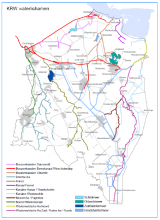Case study:Taarlosche Diep: Difference between revisions
Bas Wullems (talk | contribs) No edit summary |
Bas Wullems (talk | contribs) No edit summary |
||
| (5 intermediate revisions by the same user not shown) | |||
| Line 17: | Line 17: | ||
|Project picture=Waterlichamen Hunze en Aas.png | |Project picture=Waterlichamen Hunze en Aas.png | ||
|Picture description=WFD water bodies in the Hunze en Aa's water authority region. The Taarlosche Diep is part of the Drentse Aa water body. | |Picture description=WFD water bodies in the Hunze en Aa's water authority region. The Taarlosche Diep is part of the Drentse Aa water body. | ||
|Project summary=The | |Project summary=The Taarlosche Diep is a small stream that is part of the Drentsche Aa water body. It has retained most of its original meandering character, although parts of the stream system have been straightened and reinforced. The mowing regime in the Taarlosche Diep was adapted to meet WFD goals and other ecological goals. A maintenance plan is currently being developed. | ||
See also: http://www.rtvdrenthe.nl/nieuws/168154/Waterschap-verhoogt-beken-Drentsche-Aa-gebied-Omliggende-natuur-kan-zo-natter-blijven | |||
|Monitoring surveys and results=Water levels, stream discharge, bed profile and ecological parameters are regularly monitored. | |Monitoring surveys and results=Water levels, stream discharge, bed profile and ecological parameters are regularly monitored. | ||
|Project title=Taarlosche Diep | |Project title=Taarlosche Diep | ||
| Line 25: | Line 26: | ||
{{Toggle button}} | {{Toggle button}} | ||
{{Toggle content start}} | {{Toggle content start}} | ||
{{Case study subcatchment}} | {{Case study subcatchment | ||
|Subcatchment=Drentsche Aa | |||
}} | |||
{{Site | {{Site | ||
|Name=Taarlosche Diep near Drentse Aa | |Name=Taarlosche Diep near Drentse Aa | ||
| Line 38: | Line 41: | ||
|Protected species present=No | |Protected species present=No | ||
|Invasive species present=No | |Invasive species present=No | ||
|Dominant substrate=Sand, | |Dominant substrate=Sand, Peat, | ||
|River corridor land use=Grassland, Intensive agriculture (arable), Tall herb/rank vegetation, | |River corridor land use=Grassland, Intensive agriculture (arable), Tall herb/rank vegetation, | ||
}} | }} | ||
| Line 57: | Line 60: | ||
{{Additional Documents end}} | {{Additional Documents end}} | ||
{{Additional links and references header}} | {{Additional links and references header}} | ||
{{Additional links and references | |||
|Link=www.rtvdrenthe.nl/nieuws/168154/Waterschap-verhoogt-beken-Drentsche-Aa-gebied-Omliggende-natuur-kan-zo-natter-blijven | |||
|Description=News item about the water authority's restoration measures in this region | |||
}} | |||
{{Additional links and references footer}} | {{Additional links and references footer}} | ||
{{Supplementary Information}} | {{Supplementary Information}} | ||
{{Toggle content end}} | {{Toggle content end}} | ||
Latest revision as of 13:10, 9 March 2021
This case study is pending approval by a RiverWiki administrator.
Project overview
| Status | Complete |
|---|---|
| Project web site | |
| Themes | Habitat and biodiversity, Hydromorphology, Monitoring, Water quality |
| Country | Netherlands |
| Main contact forename | Emiel |
| Main contact surname | Galetzka |
| Main contact user ID | |
| Contact organisation | Waterschap Hunze en Aa's |
| Contact organisation web site | http://hunzeenaas.nl |
| Partner organisations | |
| Parent multi-site project | |
| This is a parent project encompassing the following projects |
No |
Project summary
The Taarlosche Diep is a small stream that is part of the Drentsche Aa water body. It has retained most of its original meandering character, although parts of the stream system have been straightened and reinforced. The mowing regime in the Taarlosche Diep was adapted to meet WFD goals and other ecological goals. A maintenance plan is currently being developed.
See also: http://www.rtvdrenthe.nl/nieuws/168154/Waterschap-verhoogt-beken-Drentsche-Aa-gebied-Omliggende-natuur-kan-zo-natter-blijven
Monitoring surveys and results
Water levels, stream discharge, bed profile and ecological parameters are regularly monitored.
Lessons learnt
Image gallery
|
Catchment and subcatchmentSelect a catchment/subcatchment
Catchment
Subcatchment
Other case studies in this subcatchment: Anloërdiepje, Gastersche Diep, Zeegserloopje
Site
Project background
Cost for project phases
Reasons for river restoration
Measures
MonitoringHydromorphological quality elements
Biological quality elements
Physico-chemical quality elements
Any other monitoring, e.g. social, economic
Monitoring documents
Additional documents and videos
Additional links and references
Supplementary InformationEdit Supplementary Information
| ||||||||||||||||||||||||||||||||||||||||||||||||||||||||||||||||||||||||||||||||||||||||||||||||||||||||||||||||||||||||||||||||||||||||||||||||||||||||||||||||||||||||||||||||||||||||||||||||||||||||||

